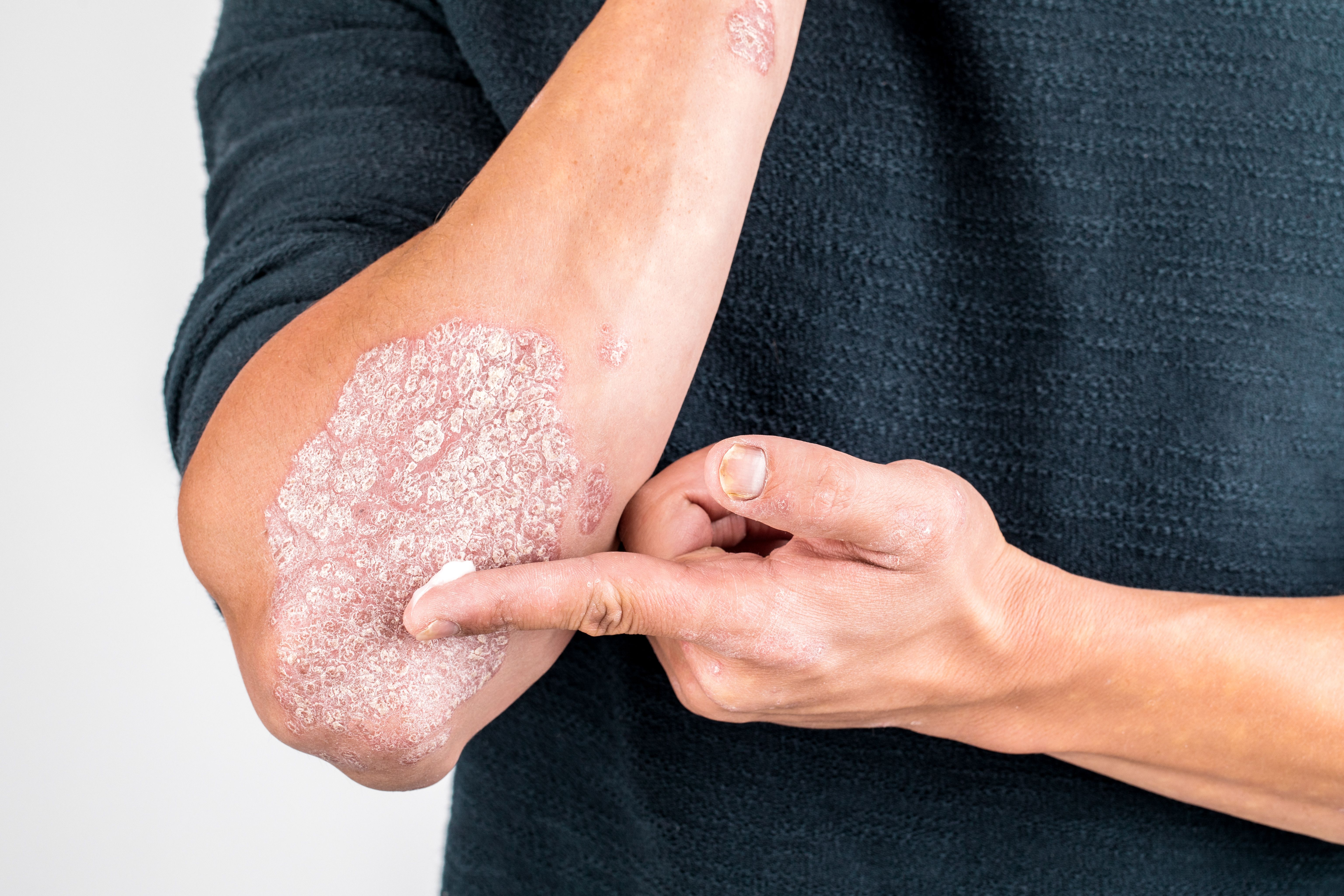- Acne
- Actinic Keratosis
- Aesthetics
- Alopecia
- Atopic Dermatitis
- Buy-and-Bill
- COVID-19
- Case-Based Roundtable
- Chronic Hand Eczema
- Chronic Spontaneous Urticaria
- Drug Watch
- Eczema
- General Dermatology
- Hidradenitis Suppurativa
- Melasma
- NP and PA
- Pediatric Dermatology
- Pigmentary Disorders
- Practice Management
- Precision Medicine and Biologics
- Prurigo Nodularis
- Psoriasis
- Psoriatic Arthritis
- Rare Disease
- Rosacea
- Skin Cancer
- Vitiligo
- Wound Care
Article
A revolution in psoriasis care
Author(s):
Newer medications have revolutionized psoriasis care in patients with moderate-to-severe cases, says a leading dermatologist, and more drugs in the pipeline promise to offer even more choices.
Newer medications have revolutionized psoriasis care in patients with moderate-to-severe cases, says a leading dermatologist, and more drugs in the pipeline promise to offer even more choices.
“Therapies keep getting better and better, and we’re successfully treating a higher percentage of people,” says Neil J. Korman, M.D., Ph.D., professor of dermatology at University Hospitals Case Medical Center and clinical director with the Murdough Family Center for Psoriasis in Cleveland.
But there’s a problem: Many patients - and some physicians - are wary of the biologics that have made such a difference in quality of life for patients.
RELATED: Biologic holiday a question of risk management
“Unfortunately, lots of people are reluctant about these medications,” says Dr. Korman, who gave a presentation about psoriasis treatment at the Orlando Dermatology Aesthetic & Clinical Conference in January. “Dermatologists are notoriously conservative, and many of them will be afraid to use drugs like this in our medical-legal environment,” said. “And patients will think ‘this stuff will kill me.’”
According to the National Psoriasis Foundation, the condition affects about 9 million people in the United States or 3% of the population. Psoriasis tends to appear in patients in their 20s and 50s to 60s.
A previous generation of injectable drugs has fallen by the wayside in recent years.
“No one uses them anymore,” Dr. Korman says, because their results couldn’t stack up compared with biologic drugs. “For injectables, maybe 20% of patients were 75% better. Now with the newest therapies, 50-60% are improved by 90%.”
The results are so positive that dermatologists are shifting toward improvement of 90% - or even 100% - as a therapeutic standard, Dr. Korman says.
“We have progressed from thinking about improving a minority of patients to being able to clear a majority of patients. It’s a revolution, an enormous difference.”
But to reach these levels of success, Dr. Korman says, dermatologists have to be willing to prescribe biologics for appropriate psoriasis patients instead of topical therapy.
“They should not use topical therapy to treat moderate-to-severe psoriasis - when it affects more than 10% of body or they have significant involvement in areas like the face, palm and soles or genitals. They’re candidates for systemic therapy and should be treated appropriately: People who have significant disease need to be treated with significant medicine.”
Secukinumab (Cosentyx, Novartis), an IL-17 inhibitor, is currently available, as is apremilast (Otezla, Celgene). Tofacitanib citrate (Xeljanz, Pfizer), a JAK inhibitor, is FDA-approved for rheumatoid arthritis, and its manufacturer is seeking FDA approval for treatment of psoriasis. Of patients who take secukinumab, 54-59% see improvement of at least 90%.
RELATED: FDA approves secukinumab for psoriatic arthritis
“All of the drugs can theoretically suppress the immune system,” Dr. Korman cautions. “We need to monitor for increased risk of infection and order blood tests. But there’s not an enormous amount of difference between one and another in terms of that risk.”
There’s also a risk of exacerbating or creating new cases of multiple sclerosis congestive heart failure and tuberculosis, Dr. Korman says. Still, “a lot of people have gotten the message out there that these are dangerous drugs, and we shouldn’t use them,” he says. “The evidence is pretty clear that it’s almost the exact opposite.”
NEXT: Cost considerations
Cost considerations
In terms of cost, Dr. Korman says it can be difficult to get insurers to cover these medications.
“It’s hard for all of them. It varies from location to location and the kind of insurance your patients have. The drugs are all very expensive, and you have to go through a lot of steps to get them. But for the people you’re able to succeed with, it can help them enormously.”
Dr. Korman points to two other new biologics on the horizon: guselkumab (J&J) and tildrakizumab (Sun Pharmaceutical). Both are IL-23 inhibitors and currently in phase 3 trials, Dr. Korman says.
Two other IL-17 inhibitors, ixekizumab (Eli Lilly) and brodalumab (Valeant), are awaiting FDA approval. Studies of ixekizumab and brodalumab suggest 70% of patients could reach levels of at least 90% improvement.
Why are the new drugs important if they only may modestly improve on the existing medications? Dr. Korman says it’s crucial to develop more options for patients.
“I have plenty of people currently who have seen seven different drugs, and none of them work really well: They have side effects or their insurance won’t pay for it. They’re waiting for the eighth. That’s the value that is added.”
In the big picture, Dr. Korman says, the current and upcoming drugs offer the prospect of remarkable improvement.
“People will tell you stories about how ‘I now wear shorts, I never wore shorts in my entire life.’ Or ‘I got married. Before, I had psoriasis in my private area, I never wanted anyone to see that. Now, I feel more confident, more willing to function in the world.’ It can change their lives.”
Disclosure: Dr. Korman has been an investigator, consultant, advisor, and/or speaker for AbbVie, Amgen, Celgene, Chugai Pharmaceutical Co., Eli Lilly , Janssen, Merck, Novartis, and Pfizer.
Newsletter
Like what you’re reading? Subscribe to Dermatology Times for weekly updates on therapies, innovations, and real-world practice tips.









